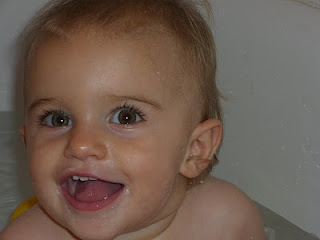 While Cleo and I were driving to a playground the other morning, WBJC offered up a welcome helping of Mozart: specifically, Mozart's sonata for four hands, which he wrote when he was nine, after experimenting on a keyboard with his sister, Maria. Not knowing the piece, I later looked it up online, and soon came across Wikipedia's entry, which was enjoyable for a few reasons.
While Cleo and I were driving to a playground the other morning, WBJC offered up a welcome helping of Mozart: specifically, Mozart's sonata for four hands, which he wrote when he was nine, after experimenting on a keyboard with his sister, Maria. Not knowing the piece, I later looked it up online, and soon came across Wikipedia's entry, which was enjoyable for a few reasons.First: the piece is catalogued as K.19d. In other words, it was Mozart's 19th scored work. At the age, again, of nine. I think that I might have watched The Electric Company 19 times by my 9th birthday. And perhaps I owned 19 baseball cards. But sonatas? For some reason, I never seem to have written them down. But I also liked, for different reasons, the entry's summary of the work's style: "His father's harsh demands are clearly portrayed in this early work, but despite this, Mozart's independence was still in a vague stage of development."
I don't think that I make many harsh demands on Cleo - though I will, at some point, make damn sure that she respects a good strawberry-rhubarb pie. This past week, though, I spent a few moments showing her how to make a small tower out of blocks. I'd erected many earlier towers in her presence, as she played or rolled about, but this time she seemed interested, and alert. And, a moment later, took things into her own small hands. One block on another, at a jagged angle: it stands! And then a third, equally canted, like a wobbly turret in a book by Dr. Seuss: and the tower falls. But Cleo, undeterred, starts again, and again, pausing occasionally to look at me or to give herself a small round of applause. And soon enough there's a shaky tower of five little blue cubes, erected by a 13-month-old.
If there was a Wikipedia entry on Cleo's tower building, then, I suppose it might claim that her approach is "still in a vague style of development." We haven't yet reached six blocks. And such an entry wouldn't, I don't think, attribute such work to a father's harsh demands. But if it was truly accurate, it might well note that there was a beaming father only a few inches away.
I don't think that I make many harsh demands on Cleo - though I will, at some point, make damn sure that she respects a good strawberry-rhubarb pie. This past week, though, I spent a few moments showing her how to make a small tower out of blocks. I'd erected many earlier towers in her presence, as she played or rolled about, but this time she seemed interested, and alert. And, a moment later, took things into her own small hands. One block on another, at a jagged angle: it stands! And then a third, equally canted, like a wobbly turret in a book by Dr. Seuss: and the tower falls. But Cleo, undeterred, starts again, and again, pausing occasionally to look at me or to give herself a small round of applause. And soon enough there's a shaky tower of five little blue cubes, erected by a 13-month-old.
If there was a Wikipedia entry on Cleo's tower building, then, I suppose it might claim that her approach is "still in a vague style of development." We haven't yet reached six blocks. And such an entry wouldn't, I don't think, attribute such work to a father's harsh demands. But if it was truly accurate, it might well note that there was a beaming father only a few inches away.









